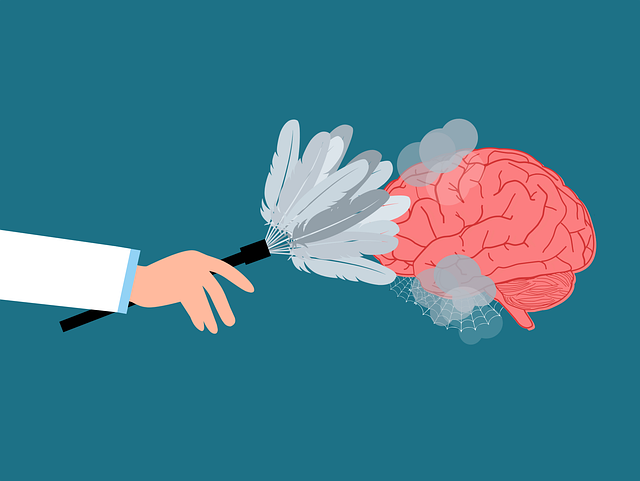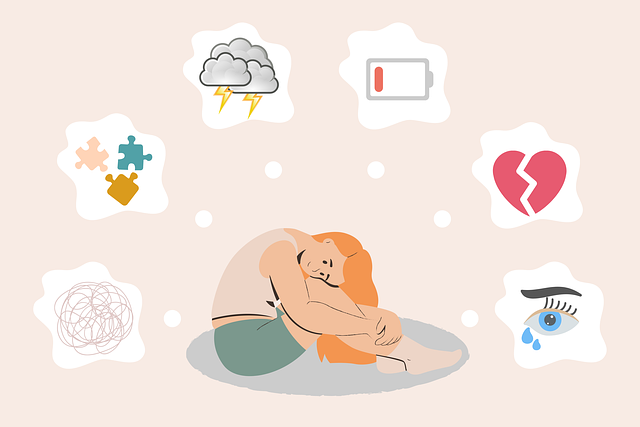The text highlights the harmful impact of stigma on individuals with Aurora Autism Spectrum Disorder (ASD), hindering access to mental health support. It proposes comprehensive solutions, such as Aurora ASD therapy focusing on mood management and mindfulness meditation, to create safe environments fostering acceptance and resilience. Key strategies include community engagement through education and outreach, empowering families, and leveraging media for accurate portrayals of ASD. Policy advocacy and changes are urged to increase funding, promote self-awareness, and develop inclusive communities, ultimately reducing stigma and encouraging help-seeking behaviors for those with ASD.
Mental illness stigma remains a significant barrier to treatment, impacting millions worldwide. This article explores targeted efforts to reduce this societal burden, focusing on Aurora Autism Spectrum Disorder (ASD) therapy as a model case study. We delve into effective strategies including community engagement programs and responsible media representation, highlighting their role in fostering understanding and empathy. Additionally, we discuss policy advocacy, emphasizing its crucial role in creating supportive environments for those navigating mental health challenges, such as individuals with ASD.
- Understanding the Impact of Stigma on Mental Health: A Focus on Aurora Autism Spectrum Disorder Therapy
- Strategies for Reducing Stigma: Community Engagement and Education Programs
- Leveraging Media Representation: Depicting Mental Illness with Authenticity and Empathy
- Policy Changes and Advocacy: Creating a Supportive Environment for Recovery
Understanding the Impact of Stigma on Mental Health: A Focus on Aurora Autism Spectrum Disorder Therapy

Stigma surrounding mental health issues can profoundly impact individuals’ willingness to seek support and treatment, potentially hindering their path to recovery. For conditions like Aurora Autism Spectrum Disorder (ASD), stigma exacerbates challenges already faced by those navigating unique cognitive and social differences. The societal misconception and lack of understanding often lead to isolation, affecting the overall well-being and quality of life for individuals with ASD.
Aurora Autism Spectrum Disorder Therapy plays a pivotal role in countering these negative effects through comprehensive approaches such as Mood Management techniques, Crisis Intervention Guidance, and Mindfulness Meditation. By providing safe spaces where individuals feel understood, these therapeutic methods foster acceptance, self-compassion, and resilience, thereby reducing the devastating impact of stigma on mental health for people with ASD.
Strategies for Reducing Stigma: Community Engagement and Education Programs

Reducing stigma around mental health issues is a collective effort that requires strategic initiatives. One powerful approach involves engaging communities and implementing education programs tailored to specific needs. For instance, focusing on conditions like Aurora Autism Spectrum Disorder (ASD) through community outreach can foster understanding. These programs aim to educate the public about ASD’s unique challenges and strengths, breaking down misconceptions often associated with autism.
Community engagement goes beyond awareness; it encourages empathy and support. Therapy sessions that include family members or caregivers in the process can further enhance this. By educating these support systems, individuals with ASD and their families can navigate social interactions more easily. This holistic approach to stigma reduction not only improves self-esteem for those affected but also strengthens community bonds, creating a more inclusive environment for all, including those with mental health challenges.
Leveraging Media Representation: Depicting Mental Illness with Authenticity and Empathy

In today’s digital era, media plays a pivotal role in shaping public perceptions about mental illness. Leveraging media representation to depict conditions like Aurora Autism Spectrum Disorder (ASD) with authenticity and empathy is crucial for stigma reduction efforts. When portrayed accurately, these depictions can foster understanding, compassion, and support from the broader community. For instance, showcasing individuals with ASD navigating their emotional healing processes through therapy can challenge stereotypes and emphasize the effectiveness of specialized treatments, such as those offered by professionals in Aurora ASD therapy programs.
Designing mental health education programs that incorporate diverse media content can enhance awareness and promote mind over matter principles. By presenting real-life stories and experiences, these programs can help break down misconceptions and encourage empathy among various demographics. This approach aligns with the broader goal of integrating mental health education into mainstream discourse, ensuring that everyone, regardless of their background or beliefs, has access to accurate information about emotional well-being.
Policy Changes and Advocacy: Creating a Supportive Environment for Recovery

Policy changes and advocacy play a pivotal role in fostering a supportive environment for mental health recovery, especially for conditions like Aurora Autism Spectrum Disorder (ASD). By implementing inclusive policies, governments can ensure that individuals with ASD have access to specialized therapy and support services tailored to their unique needs. This involves advocating for increased funding allocation towards research and treatment options, promoting education programs that enhance self-awareness exercises, and developing community outreach initiatives that foster empathy building strategies among the general population.
These efforts are crucial in reducing the stigma associated with mental illness. When policy changes reflect a deeper understanding of ASD, they encourage open conversations about anxiety relief, challenge misconceptions, and create safe spaces for individuals to seek help without fear of judgment. By integrating advocacy into mental health initiatives, communities can build a more supportive infrastructure that facilitates recovery and overall well-being for those living with ASD.
In addressing mental illness stigma, various strategies prove effective, from community engagement and education programs to authentic media representation. As highlighted by Aurora Autism Spectrum Disorder Therapy, understanding the impact of stigma on mental health is a crucial first step towards fostering an inclusive environment for recovery. Policy changes and advocacy further reinforce these efforts, ensuring support systems are in place for those navigating mental health challenges. By combining these approaches, we can significantly reduce stigma and promote better mental health outcomes for all.














